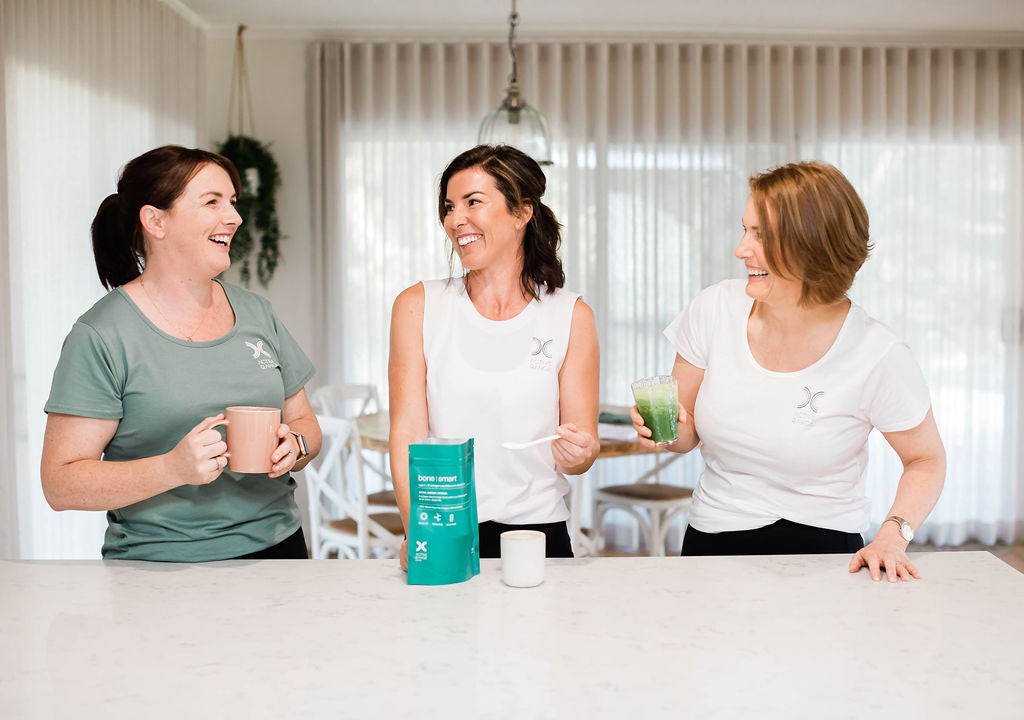Why should I be concerned about my bones in my 40’s?
As a woman in your 40’s or 50’s, improving your bone health is probably right at the bottom of your to-do-list (somewhere below cleaning the oven). Fine lines, grey hairs and fighting off menopause are more likely on your radar than your bone health. But here’s the thing – your bones are the foundation of your strength – responsible for keeping you stable, solid, and upright.
Your bones should be strong yet flexible to allow movement and protection of your vital organs. Bone is living tissue with peak mass being reached in your mid 30’s, then it’s really time to give the bones the attention they deserve to ensure you continue to live an Active. Vibrant. Life.
Why focus on bone health?
To fend off the silent disease: Osteoporosis
Osteoporosis is a disease of the bones. People may not even know they have it until they break a bone, and that means that the disease is already well advanced. The most common sites to break are the hip, wrist and spine. Women are more at risk with over 50% being diagnosed over the age of 50, shocking statistics!!
The amazing thing about osteoporosis is that it could be preventable.
I think my bones are OK, am I really at risk?
The most common risk factors which are important to know:
Family History: There are some factors we have no control, family history being one: If someone in your family has or had osteoporosis, then you are more at risk. Speaking to your parents/ siblings to understand your future bone health is important to make those extra early pro-active choices to future-proof your bones.
Gender : Women are more at risk due to Estrogen levels: Estrogen protects bones and during Menopause your levels decrease, which is why during peri-menopause/ menopause you need to be especially vigilant about your bone health. Women may lose bone at a rate of 4 to 8% per year for several years after their ovaries stop producing estrogen. If you have had your ovaries removed, there is still a risk of Osteoporosis
Medical History : Certain medical conditions can impact bone health such as previously breaking a bone, diabetes, thyroid disease, cancer treatment. Inactive women with a low body mass would be considered at risk of osteoporosis, so please women let’s focus on being STRONG.
Medication: There are certain medications which can be bad for the bones, it important to speak to your health provider and discuss these risks:
- Corticosteroids – commonly used for asthma, rheumatoid arthritis or other inflammatory conditions
- Steroid medication: Prednisone & Cortisone
Low intake of Vitamin D & Calcium: Vitamin D is needed to absorb the calcium, both are equally important for bone health.
Movement to empower your future- self
Do men get Osteoporosis?
Bone health affects everyone, the loss of bone strength naturally occurs as part of aging, slowing down the process is what we can work on together through targeted exercise.
Research supports exercise prescription: High-intensity, progressive resistance and impact weight-bearing training (HiRIT) is a natural therapeutic option for prevention and treatment of Osteoporosis.
Good news ladies and gents, It’s completely achievable to have strong, healthy bones into your 60’s and beyond; because there’s no plan B for a vibrant quality of life.
Our studio in Flaxton, Sunshine Coast QLD, offers 'bone strong' classes. Steph is Onero trained and prescribes exercise to target bone strength while improving posture and balance.


